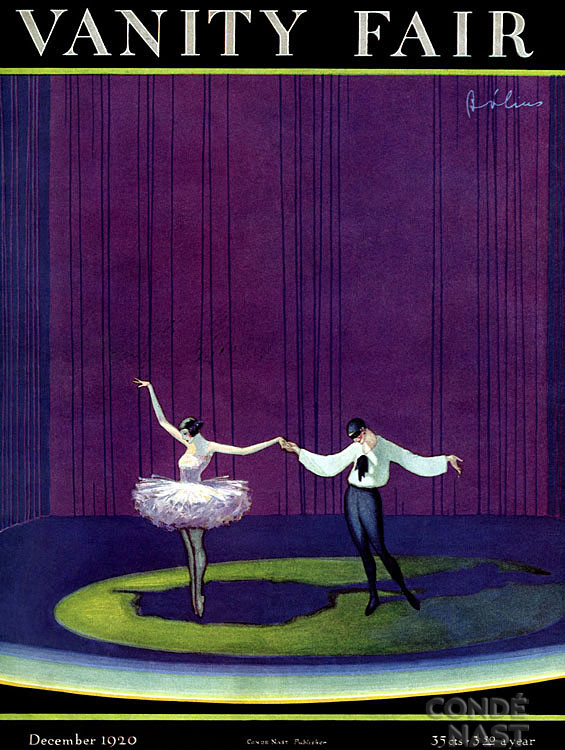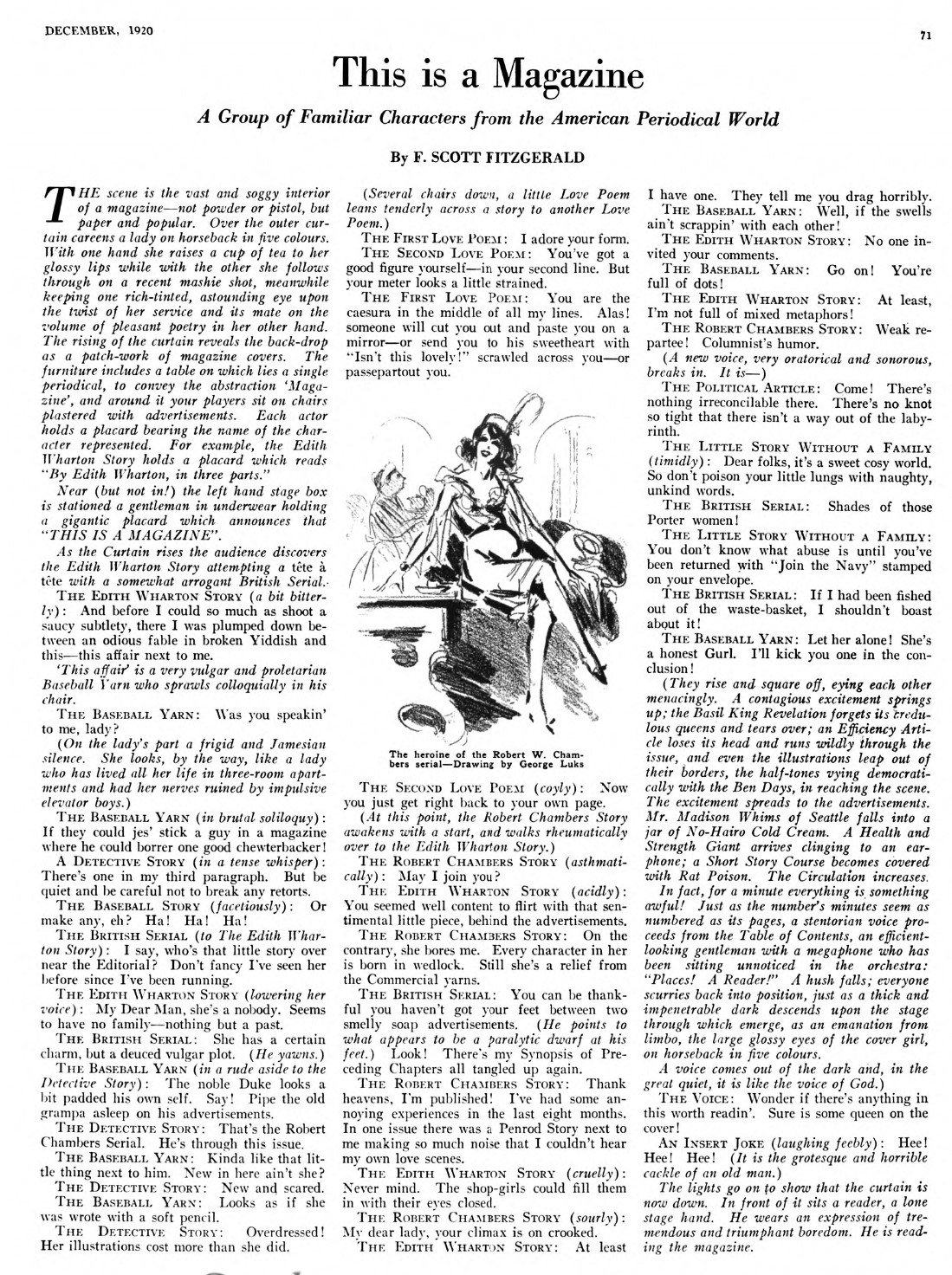
This is a Magazine
A Group of Familiar Characters from the American Periodical World
By F. Scott Fitzgerald
The scene is the vast and soggy interior of a magazine—not powder or pistol, but paper and popular. Over the outer curtain careens a lady on horseback in five colours. With one hand she raises a cup of tea to her glossy lips while with the other she follows through on a recent mashie shot, meanwhile keeping one rich-tinted, astounding eye upon the twist of her service and its mate on the volume of pleasant poetry in her other hand. The rising of the curtain reveals the backdrop as a patch-work of magazine covers. The furniture includes a table on which lies a single periodical, to convey the abstraction “Magazine”, and around it your players sit on chairs plastered with advertisements. Each actor holds a placard bearing the name of the character represented. For example, the Edith Wharton Story holds a placard which reads “By Edith Wharton, in three parts.”
Near (but not in!) the left hand stage box is stationed a gentleman in underwear holding a gigantic placard which announces that “THIS IS A MAGAZINE”.
As the Curtain rises the audience discovers the Edith Wharton Story attempting a tete a tete with a somewhat arrogant British Serial.
THE EDITH WHARTON STORY: (a bit bitterly) And before I could so much as shoot a saucy subtlety, there I was plumped down between an odious fable in broken Yiddish and this—this affair next to me.
“This affair” is a very vulgar and proletarian Baseball Yarn who sprawls colloquially in his chair.
THE BASEBALL YARN: Was you speakin' to me, lady?
(On the lady's part a frigid and Jamesian silence. She looks, by the way, like a lady who has lived all her life in three-room apartments and had her nerves ruined by impulsive elevator boys.)
THE BASEBALL YARN: (in brutal soliloquy) If they could jes' stick a guy in a magazine where he could borrer one good chewterbacker!
A DETECTIVE STORY: (in a tense whisper) There's one in my third paragraph. But be quiet and be careful not to break any retorts.
THE BASEBALL STORY: (facetiously) Or make any, eh? Ha! Ha! Ha!
THE BRITISH SERIAL: (to The Edith Wharton Story) I say, who's that little story over near the Editorial? Don't fancy I've seen her before since I've been running.
THE EDITH WHARTON STORY: (lowering her voice) My Dear Man, she's a nobody. Seems to have no family—nothing but a past.
THE BRITISH SERIAL: She has a certain charm, but a deuced vulgar plot. (He yawns.)
THE BASEBALL YARN: (in a rude aside to the Detective Story) The noble Duke looks a bit padded his own self. Say! Pipe the old grampa asleep on his advertisements.
THE DETECTIVE STORY: That's the Robert Chambers Serial. He's through this issue.
THE BASEBALL YARN: Kinda like that little thing next to him. New in here ain't she?
THE DETECTIVE STORY: New and scared.
THE BASEBALL YARN: Looks as if she was wrote with a soft pencil.
THE DETECTIVE STORY: Overdressed! Her illustrations cost more than she did.
(Several chairs down, a little Love Poem leans tenderly across a story to another Love Poem.)
THE FIRST LOVE POEM: I adore your form.
THE SECOND LOVE POEM: You've got a good figure yourself—in your second line. But your meter looks a little strained:
THE FIRST LOVE POEM: You are the caesura in the middle of all my lines. Alas! Someone will cut you out and paste you on a mirror—or send you to his sweetheart with “Isn't this lovely!” scrawled across you—or passepartout you.
THE SECOND LOVE POEM: (coyly) Now you just get right back to your own page.
(At this point, the Robert Chambers Story awakens with a start, and walks rheumatically over to the Edith Wharton Story.)
THE ROBERT CHAMBERS STORY: (asthmatically) May I join you?
THE EDITH WHARTON STORY: (acidly) You seemed well content to flirt with that sentimental little piece, behind the advertisements.
THE ROBERT CHAMBERS STORY: On the contrary, she bores me. Every character in her is born in wedlock. Still she's a relief from the Commercial yarns.
THE BRITISH SERIAL: You can be thankful you haven't got your feet between two smelly soap advertisements. (He points to what appears to be a paralytic dwarf at his feet.) Look! There's my Synopsis of Preceding Chapters all tangled up again.
THE ROBERT CHAMBERS STORY: Thank heavens, I'm published! I've had some annoying experiences in the last eight months. In one issue there was a Penrod Story next to me making so much noise that I couldn't hear my own love scenes.
THE EDITH WHARTON STORY: (cruelly) Never mind. The shop-girls could fill them in with their eyes closed.
THE ROBERT CHAMBERS STORY: (sourly) My dear lady, your climax is on crooked.
THE EDITH WHARTON STORY: At least I have one. They tell me you drag horribly.
THE BASEBALL YARN: Well, if the swells ain't scrappin' with each other!
THE EDITH WHARTON STORY: No one invited your comments.
THE BASEBALL YARN: Go on! You're full of dots!
THE EDITH WHARTON STORY: At least, I'm not full of mixed metaphors!
THE ROBERT CHAMBERS STORY: Weak repartee! Columnist's humor.
(A new voice, very oratorical and sonorous, breaks in. It is—)
THE POLITICAL ARTICLE: Come! There's nothing irreconcilable there. There's no knot so tight that there isn't a way out of the labyrinth.
THE LITTLE STORY WITHOUT A FAMILY: (timidly) Dear folks, it's a sweet cosy world. So don't poison your little lungs with naughty, unkind words.
THE BRITISH SERIAL: Shades of those Porter women!
THE LITTLE STORY WITHOUT A FAMILY: You don't know what abuse is until you've been returned with “Join the Navy” stamped on your envelope.
THE BRITISH SERIAL: If I had been fished out of the waste-basket, I shouldn't boast about it!
THE BASEBALL YARN: Let her alone! She's a honest Gurl. I'll kick you one in the conclusion!
(They rise and square off, eying each other menacingly. A contagious excitement springs up; the Basil King Revelation forgets its credulous queens and tears over; an Efficiency Article loses its head and runs wildly through the issue, and even the illustrations leap out of their borders, the half-tones vying democratically with the Ben Days, in reaching the scene. The excitement spreads to the advertisements. Mr. Madison Whims of Seattle falls into a jar of No Hairo Cold Cream. A Health and Strength Giant arrives clinging to an earphone; a Short Story Course becomes covered with Rat Poison. The Circulation increases.
In fact, for a minute everything is something awful! Just as the number's minutes seem as numbered as its pages, a stentorian voice proceeds from the Table of Contents, an efficient-looking gentleman with a megaphone who has been sitting unnoticed in the orchestra: “Places! A Reader!” A hush falls; everyone scurries back into position, just as a thick and impenetrable dark descends upon the stage through which emerge, as an emanation from limbo, the large glossy eyes of the cover girl, on horseback in five colours.
A voice comes out of the dark and, in the great quiet, it is like the voice of God.)
THE VOICE: Wonder if there's anything in this worth readin'. Sure is some queen on the cover!
AN INSERT JOKE: (laughing feebly) Hee! Hee! Hee! (It is the grotesque and horrible cackle of an old man.)
The lights go on to show that the curtain is now down. In front of it sits a reader, a lone stage hand. He wears an expression of tremendous and triumphant boredom. He is reading the magazine.
Published in Vanity Fair magazine (XV, December 1920)).
Illustrations by George Luks.

